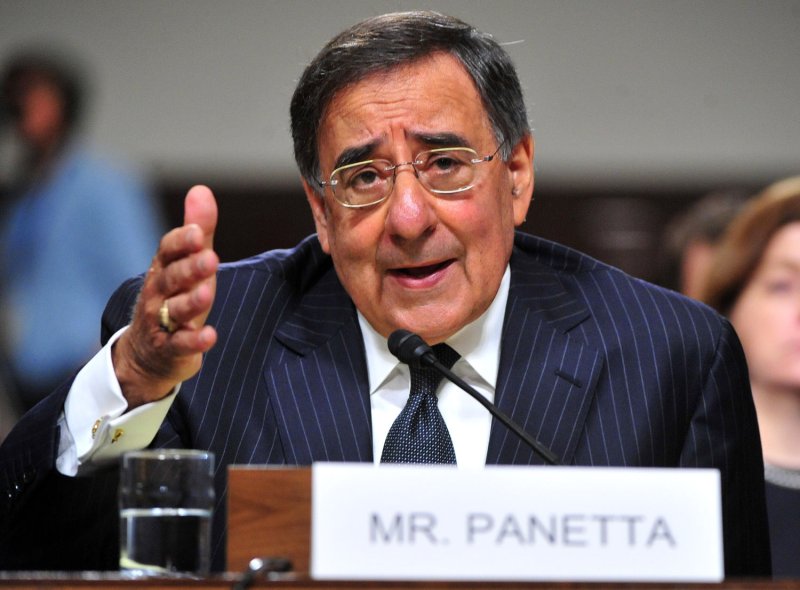CIA Director Leon Panetta testifies during his Senate Armed Services confirmation hearing to be the next Secretary of Defense in Washington on June 9, 2011. UPI/Kevin Dietsch |
License Photo
WASHINGTON, June 15 (UPI) -- U.S. President Barack Obama is putting in place a new national security team from the Pentagon to the CIA. The new team will have to respond to what everyone knows will be "tough choices," made tougher by budget cuts likely to be a lot bigger than people think.
But, unless fixed, three deadly flaws make that job even more difficult if not impossible.
First, for much of the 20th century, and certainly until the Cold War ended, national security and national defense were largely synonymous. Of course, the United States relied on the U.S. State Department and the CIA. However, practically, the size and strength of its military forces embraced most of national security. In what NATO's military commander U.S. Navy Adm. James Stavridis calls the "new, new world," the boundaries of national security far exceed those of defense. Unfortunately, this flaw is exacerbated by a second.
America's national security is still organized by the original National Security Act passed in 1947. That law defined the responsibilities and authorities of what would be the new Department of Defense and CIA as well as the National Security Council in terms of "stove pipes" or compartments suited to take on the Soviet Union.
The most significant change since was the creation of the Department of Homeland Security after Sept. 11, 2001. Unfortunately, the current structure remains a creature of the last century, not the 21st, unsuited for many threats and dangers beyond those posed by a well armed superpower adversary.
Finally, despite Defense Secretary Robert Gates' challenge to NATO at last week's meeting of defense ministers collectively to pull up its socks or face a "dim or dismal" future, Americans have tired of a decade of war in Afghanistan and eight years in Iraq. Public attitudes will determine much of where and how much America will spend on its national security especially when debts, deficits and unemployment all paint a grim economic picture at home.
In a rational world, these three deadly flaws would be confronted and actions taken to rectify the obvious and even the subtle misalignments and lacunae in the current structure and strategy beginning with redefining and restating the links and separations between national security and national defense. From this assessment, the National Security Act would be rewritten accordingly and include the role of Congress, more specifically in terms of oversight and interaction with the executive branch.
The mechanisms for such a process are in place. The Quadrennial Defense Review and the State Department equivalent could be used as foundations for this assessment. And a broader commission could be established for this purpose.
In both cynical and practical terms, such a review won't occur at least not in keeping with the need and the reality that we aren't organized for the current and future challenges to our security.
The reason is that the political system has lost the courage to face up to tough issues and choices.
Meanwhile, budgets will almost certainly be slashed as we bring our forces home from Iraq and Afghanistan probably more quickly than is currently planned or expected.
And if the outcome is a world at least as chaotic and dangerous in menacing our interests along with those of friends and allies, we shouldn't be surprised.
If this nation is serious about its future and, given an apparent lack of urgency in taking on the debt and deficit, it may well not be, political workarounds exist to limit the damage of these deadly flaws. Most importantly, the nation needs to undertake now a physical examination of the real state of its national and homeland security. Such an exercise must be ruthlessly objective with no holds barred.
Next, the only way to reconcile the profound inconsistencies between national security and national defense is through fundamental organizational change. The U.S. military is organized around regional and functional unified commands each with an admiral or general in charge. The regional geographic commands must be transformed to reflect a "whole of government" approach that brings all of the nation's national security resources to bear. In some cases, the commander may not be a military officer.
This command structure would report directly to the National Security Council and the president with the key departments and agencies such as Defense, State, Treasury, Justice, National Intelligence and Homeland Security providing the personnel, resources and capabilities directly to these commands in addition to their other responsibilities. This isn't the case today.
Finally, professionals are needed to serve. Doubling the service academies and ROTC units in size to graduate individuals who will serve in national security jobs across the board, perhaps with reserve military commissions, will provide a cadre for keeping our nation safe and secure.
Without actions such as these, beware. Unchecked, these three deadly flaws will cause the nation grievous harm.
--
(Harlan Ullman is chairman of the Killowen Group, which advises leaders of government and business, and senior adviser at Washington's Atlantic Council.(
--
(United Press International's "Outside View" commentaries are written by outside contributors who specialize in a variety of important issues. The views expressed do not necessarily reflect those of United Press International. In the interests of creating an open forum, original submissions are invited.)















